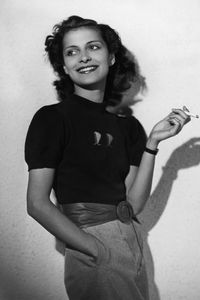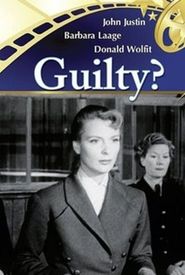Born on May 5, 1920, in the quaint French town of Maisons-Laffitte, Andrée Debar was destined for a life of artistic expression, her innate talents and abilities already evident from a young age. However, it was not in her birthplace that she spent her formative years, but rather in the picturesque Grand Duchy of Luxembourg, where she blossomed academically, her intellectual curiosity and thirst for knowledge driving her to excel in her studies. With each passing year, her passion for learning only grew stronger, ultimately culminating in her graduation from high school with distinction, a testament to her hard work and dedication.
Andrée's remarkable linguistic dexterity was significantly moulded by the distinctive cultural heritage that she inherited from her English grandmother, whose own linguistic influences had a profound impact on Andrée's formative years. This cultural legacy was further enriched by her residency in a region where French and German are the dominant spoken languages, thereby exposing her to a diverse range of linguistic traditions and dialects that have contributed to her remarkable linguistic versatility.
As she completed her academic journey, she embarked on a new adventure, enrolling in the prestigious Conservatory of Music and Comedy in Luxembourg, thereby nurturing her inherent talent for acting.
Following her relocation to the City of Light, she continued to refine her craft in the realm of drama under the guidance of the accomplished Marcelle Géniat, until the year 1949, when a highly sought-after invitation awaited her in Egypt, courtesy of the renowned Jean Cocteau.
Andrée's remarkable career trajectory commenced as early as 1940, with a debut appearance in a short film that masterfully showcased her burgeoning talent, laying the groundwork for a future replete with creative triumphs.
Andrée's remarkable trajectory in the realm of cinema was marked by a plethora of significant accomplishments, yet one of the most outstanding and enduring milestones in her illustrious career was undoubtedly her captivating portrayal in the 1947 film "They Are Not Angels". This cinematic masterpiece not only showcased Andrée's exceptional acting prowess, but also firmly established her as a burgeoning star, poised to make a lasting impact on the world of entertainment.
Andrée's remarkable physical appearance, marked by a slender and refined physique, undoubtedly played a crucial role in her initial rise to prominence. Yet, it was her singular and mesmerizing appearance that truly distinguished her from her contemporaries. With a presence that was almost androgynous, Andrée's extraordinary aura commanded attention and left a lasting and unforgettable impression on producers, directors, and talent scouts alike, setting her apart from the rest and solidifying her status as a standout in her field.
Andrée's artistic talents were consistently and masterfully demonstrated through her ingenious utilization of her androgynous appearance, thereby granting her the capacity to access and portray a diverse array of emotions and characters.
Her remarkable performances in the two films directed by the esteemed and accomplished filmmaker Jacqueline Audry, specifically "La garçonne" released in 1957 and "Le secret du Chevalier d'Éon" in 1959, unequivocally showcased her remarkable ability to convey complex physical ambiguity, thus solidifying her status as a talented and versatile performer.
Andrée Debar, a gifted thespian, made the momentous choice to bid farewell to her acting career after the culmination of her cinematic endeavors, thereby relinquishing the opportunity to forge a more lasting impression on the entertainment industry during the revolutionary 1960s and 1970s, an era characterized by an atmosphere of daring experimentation and pioneering spirit.
As the curtain closed on her illustrious stage career, Debar redirected her boundless energies and unwavering dedication towards the captivating realm of film production, a profession that would captivate her imagination and stir her passion for the next decade, until the dawn of 1977.
Andrée Debar, a gifted and accomplished actress, made the bold and unexpected decision to abandon her thriving cinematic career, opting instead to embark on a novel and exciting venture with her long-standing friend and fellow actress, the renowned Sophie Desmarets.
Together, these two talented women, who had undoubtedly shared countless memories and experiences within the world of film, joined forces to open an enchanting and eclectic antique shop, marking a significant and profound shift in Debar's professional life.
This remarkable change of pace and direction not only served as a testament to Debar's adaptability and entrepreneurial spirit, but also allowed her to explore and cultivate new passions and interests outside of the entertainment industry.
As Debar delved into the world of antiques, she undoubtedly brought with her a unique set of skills and perspectives, honed from her years of experience as a performer, and applied them to the art of curating and collecting rare and precious items.
In doing so, Debar's antique shop became a haven for those seeking unique and fascinating treasures, and a reflection of her own eclectic and refined taste.
Through this new venture, Debar not only demonstrated her ability to evolve and adapt, but also showcased her remarkable talent for discovery and her passion for sharing her finds with others.
As a result, Debar's antique shop quickly established itself as a beloved and iconic destination, attracting visitors from far and wide who were drawn to its captivating charm and Debar's infectious enthusiasm.
And so, Andrée Debar's decision to leave behind the glamour of Hollywood and pursue a new path proved to be a wise and inspired one, allowing her to flourish in a new and unexpected way, and cementing her reputation as a true renaissance woman.
As the passage of time continued to unfold, the remarkable talent and striking, androgynous beauty of Debar gradually slipped from the public's collective consciousness, gradually losing its once vibrant luster.
It wasn't until her unfortunate and untimely demise in the year 1999, brought about by the debilitating effects of Alzheimer's disease, that the world was suddenly and poignantly reminded of her existence, a poignant reminder of the fleeting nature of fame and the indelible mark she had left on the world.
Debar's remarkable talent and unique, androgynous beauty, which had once captivated audiences and left an indelible mark on the world of cinema, were tragically forgotten in the years following her passing. Despite her remarkable contributions to the industry, her legacy seemed to fade into obscurity, leaving behind only whispers of her remarkable talent and the unforgettable impact she had on the world of cinema. Her remarkable talent and unique, androgynous beauty, which had once been the hallmark of her remarkable career, were now nothing more than a distant memory, a reminder of what could have been if only fate had been kinder to her.
Debar's remarkable talent and unique, androgynous beauty were just a few of the many remarkable qualities that made her a standout in the world of cinema. Her remarkable talent and unique, androgynous beauty were a testament to her remarkable dedication to her craft and her remarkable ability to bring characters to life in a way that was both authentic and captivating.






















